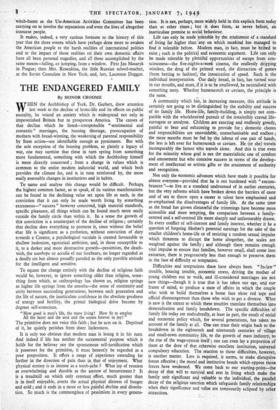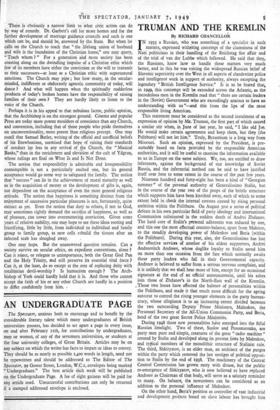THE ENDANGERED FAMILY
By HONOR CROOME
WHEN the Archbishop of York, Dr. Garbett, drew attention last week to the decline of home-life and its effects on public morality, he voiced an anxiety which is widespread not only in impoverished Britain but in prosperous America. The causes of that decline which he listed—irresponsible " sentimental and romantic" marriages, the housing shortage, preoccupation of mothers with bread-winning, the weakening of parental responsibility by State action—are identifiable enough as proximates. But with the sole exception of the housing problem, so plainly a legacy of war, one may surmise that these in turn spring from something more fundamental, something with which the Archbishop himself is more directly concerned ; from a change in values which is common to the entire modern industrial world, and which both provides the climate for, and is in turn reinforced by, the more easily assessable changes in institutions and in habits.
To name and analyse this change would be difficult. Perhaps. the highest common factor, so to speak, of its various manifestations can be found in the declining value set upon life as such, in the conviction that it can only be made worth living by something extraneous—" success " however conceived, high material standards, specific pleasures, all things which can be found much more easily outside the family circle than within it. In a sense the growth of this conviction is a counterpait of the decline of religion ; certainly that decline does everything to promote it, since without the belief 'that life is significant as a probation, without conviction of duty towards a Creator, a psychological vacuum is created favourable to shallow hedonism, egotistical ambition, and, in those susceptible to it, to a darker and more destructive growth—pessimism, the death- wish, the wanhape or accidie of our forebears, no longer regarded as a deadly sin but almost proudly paraded as the only possible attitude for the intelligent and sensitive.
To equate the change entirely with the decline of religious faith would be, however, to ignore something older than religion, some- thing from which, as anthropology has shown us, religion springs as higher life springs from the amoeba—the sense of continuity and unity between succeeding generations, between each generation and the life of nature, the inarticulate confidence in the absolute goodness of energy and fertility, the primal biological drive become by degrees self-conscious.
"How good is man's life, the mere living! How fit to employ All the heart and the soul and the senses forever in joy!
The primitive does not voice this faith ; but he acts on it. Deprived of it, he quietly perishes from sheer listlessness.
It is only too obvious that modern man is losing it in his turn. And indeed if life has neither the sacramental purpose which it holds for the believer nor the spontaneous self-justification which it possesses for the primitive, it must honestly be regarded as a poor proposition. It offers a range of experience extending far farther in the direction of pain than in that of enjoyment. What physical ecstasy is as intense as a tooth-ache ? What joy of reunion as overwhelming and durable as the sorrow of bereavement ?' It is a treadmill on which only constant effort, much greater than is in itself enjoyable, averts the actual physical distress of hunger and cold ; and it ends in a more or less painful decline and dissolu- tion. So much is the commonplace of pessimism in every genera-
Lion.. It is not, perhaps, more widely-held-in this-explicit form today than at other times ; but it does form, -as never before, an inarticulate premise to social behaviour.
Life can only be made tolerable by the attainment of a -standard of living far higher than any on which mankind has managed to find it tolerable before. Modern man, in fact, must be bribed to exist ; such is the political and economic argument. Life can only be made tolerable by plentiful opportunities of escape from con- sciousness—the five-nights-a-week cinema, the endlessly dripping wireless, the drug of the printed word, the distraction of games (from betting to fashion), the intoxication of speed. Such is the individual interpretation. Our daily bread, in fact, has turned sour in our mouths, and must, if it is to be swallowed, be neutralised with something tasty. Whether butterscotch or caviare, the principle is the same.
A community which has, in increasing measure, this attitude is certainly not going to be distinguished by the stability and success of its family life. Home-life, family-building, is simply not com- patible with the wholehearted pursuit of the irresistibly craved life- surrogate or anodyne. Children are exacting and endlessly greedy, painful to bear and exhausting to provide for ; domestic chores and responsibilities are unavoidable, unmechanisable and endless ; the more mouths must be fed by the labour of one pair of hands, the less is left over for butterscotch or caviare. He (or she) travels incomparably the fastest who travels alone. And this is true even for the minority whose goal is not the materialistic one of comfort and amusement but who conceive success in terms of the develop- ment of intellectual or artistic gifts or the attainment of authority and recognition.
Not only the economic advances which have made it possible for almost everyone—provided that he is not burdened with " encum- brances "—to live at a standard undreamed of in earlier centuries, but the very reforms which have broken down the barriers of caste and of sex to throw open a career to talent have emphasised and re-emphasised the disadvantages of family life. At the same time as the bread has grown distasteful the trimmings have become more accessible and more tempting, the comparison between a family- centred and a self-centred life more sharply and unfavourably drawn. In every conflict of self-interest and family interest, whether it be a question of forgoing Mother's potential earnings for the sake of the smaller children's home-life or of resisting a random sexual impulse which threatens to disrupt the home altogether, the scales are weighted against the family ; and although there remains enough vital impulse to ensure that families, however small, shall come into existence, there is progressively less than enough to preserve, them in the face of difficulty or temptation.
Difficulties and temptations there have always been. " In-law " trouble, housing trouble, economic stress, driving the mother of young children out to work, and ill-considered marriages are not new things—though it is true that it has taken our age, and our frame of mind, to produce a state of affairs in which the couple who wish to build themselves a home face more red tape and official discouragement than those who wish to get a divorce. What is new is the extent to which these troubles translate themselves into demoralisation and family breakdown. The specific difficulties of family life today are undoubtedly, at least in part, the result of social and economic policy which, for several generations, has taken no account of the family at all. One can trace their origin back to the breakdown in the eighteenth and nineteenth centuries of village and small-town community life, to the growth of mass industry, to the rise of the wage-system itself ; one can even lay a proportion of them at the door of that otherwise excellent institution, universal compulsory education. The reaction to those difficulties, however, is another matter. Less is required, it seems, to make disruptive forces effective ; the moral and instinctive bonds which oppose those forces have weakened. We come back to our starting-point—the decay of that will to survival and zest in living which make the family unit significant and valuable to the individual, the parallel decay of the religious sanction which safeguards family relationships when their significance and value are temporarily eclipsed by other attractions. There is obviously a narrow limit to what civic action can do by way of remedy. Dr. Garbett's call for more homes and for the further development of marriage guidance councils and such is one which can be, and should be, answered by the State. But when he calls on the Church to teach that " the lifelong union of husband and wife is the foundation of the Christian home," one may query, "Teach whom ? " For a generation and more society has been coasting along on the dwindling impulse of a Christian ethic which few of its members have either the conviction or the will to transmit to their successors—at least as a Christian ethic with supernatural sanctions. The Church may pipe ; but how many, in the secular- minded, indifferent or obdurately agnostic community of today, will dance ? And what will happen when the spiritually rudderless products of today's broken homes have the responsibility of raising families of their own ? They are hardly likely to listen to the voice of the Church.
Perhaps it is in his appeal to that nebulous factor, public opinion, that the Archbishop is on the strongest ground. Cinema and popular Press are today more potent moulders of conscience than any Church, and convention, including that of those people who pride themselves on unconventionality, more potent than religious precept. One may recall that Samuel Butler, writing of the official and unofficial beliefs of his Erewhonians, surmised that hope of raising their standards of conduct lay less in any revival of the Church, the " Musical Banks," than in the enrichment and elevation of the cult of Ydgrun, whose rulings are final on What is and Is Not Done.
The notion that responsibility is admirable and irresponsibility contemptible is not a particularly exalted one, but its general acceptance would go some way to safeguard the family. The notion that " success " can lie in the achievement of moral maturity as well as in the acquisition of money or the development of gifts is, again, not dependent on the acceptance of even the most general religious attitude. The notion that happiness is something distinct from the enjoyment of successive particular pleasures is not, fortunately, quite extinct as yet. Even the notion that duty to others, if not to God, may sometimes rightly demand the sacrifice of happiness, as well as of pleasure, can tower into overmastering conviction. Given some years of relative stability, one may hope to see these ideas rooting and fructifying, little by little, from individual to individual and family group to family group, as new cells rebuild the tissues after an infected scab has sloughed away.
One may hope. But the unanswered question remains. Can a society survive on secular ethics, on expedient conventions, alone ? Can it reject, or relegate to unimportance, both the Great God Pan and the Holy Trinity, and still preserve its essential vital force ? Can it, at the least, do so except at the cost of replacing deity with totalitarian devil-worship ? Is humanism enough ? The Arch- bishop of York could hardly hold that it is. And those who cannot accept the faith of his or any other Church are hardly in a position to differ confidently from him. -







































 Previous page
Previous page